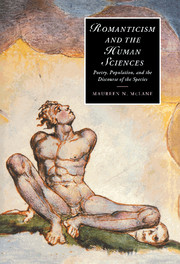Book contents
- Frontmatter
- Contents
- Acknowledgments
- Introduction, or the thing at hand
- Chapter 1 Toward an anthropologic: poetry, literature, and the discourse of the species
- Chapter 2 Do rustics think?: Wordsworth, Coleridge, and the problem of a “human diction”
- Chapter 3 Literate species: populations, “humanities,” and the specific failure of literature in Frankenstein
- Chapter 4 The “arithmetic of futurity”: poetry, population, and the structure of the future
- Chapter 5 Dead poets and other romantic populations: immortality and its discontents
- Epilogue: Immortality interminable: the use of poetry for life
- Notes
- Bibliography
- Index
- CAMBRIDGE STUDIES IN ROMANTICISM
Chapter 4 - The “arithmetic of futurity”: poetry, population, and the structure of the future
Published online by Cambridge University Press: 22 September 2009
- Frontmatter
- Contents
- Acknowledgments
- Introduction, or the thing at hand
- Chapter 1 Toward an anthropologic: poetry, literature, and the discourse of the species
- Chapter 2 Do rustics think?: Wordsworth, Coleridge, and the problem of a “human diction”
- Chapter 3 Literate species: populations, “humanities,” and the specific failure of literature in Frankenstein
- Chapter 4 The “arithmetic of futurity”: poetry, population, and the structure of the future
- Chapter 5 Dead poets and other romantic populations: immortality and its discontents
- Epilogue: Immortality interminable: the use of poetry for life
- Notes
- Bibliography
- Index
- CAMBRIDGE STUDIES IN ROMANTICISM
Summary
In Thomas Love Peacock's novel Melincourt (1817), the seventh chapter, entitled “The Principle of Population,” features a sustained conversation between the Malthusian Mr. Fax and the Shelleyan Sylvan Forester. As is typical of Peacockian style, “conversation” becomes the mode for the elegant display, dramatization, and contestation of ideas. In this as well as his other novels, Peacock's characters range widely and easily among a variety of political, intellectual, and artistic topics. Fax and Forester, in this scene, anatomize and dispute the state of human society. Among the many topics they discuss is the “principle” Malthus made infamous, the principle of population. As the following excerpt suggests, Fax and Forester address this principle, and its calculability, quite differently:
Mr. Fax.
The cause of all the evils of human society is single, obvious, reducible to the most exact mathematical calculation; and of course susceptible not only of remedy, but even of utter annihilation. The cause is the tendency of population to increase beyond the means of subsistence. The remedy is an universal social contract, binding both sexes to equally rigid celibacy, till the prospect of maintaining the average number of six children be as clear as the arithmetic of futurity can make it.
Mr. Forester.
The arithmetic of futurity has been found in a more than equal number of instances to baffle human skill. The rapid and sudden mutations of fortune are the inexhaustible theme of history, poetry, and romance …
- Type
- Chapter
- Information
- Romanticism and the Human SciencesPoetry, Population, and the Discourse of the Species, pp. 109 - 158Publisher: Cambridge University PressPrint publication year: 2000

